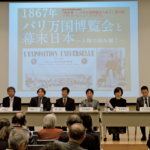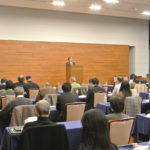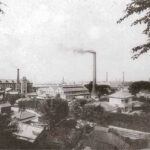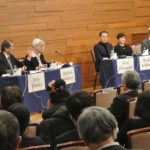Continuing our series highlighting the life and achievements of Shibusawa Eiichi (1840-1931), Inoue Jun, director of the Shibusawa Memorial Museum, examines the great entrepreneur’s work establishing and cultivating joint stock companies.
To read the PDF version of this article with photographs, click here: Wisdom of Shibusawa Eiichi Part III
Text only version follows.
Shibusawa Eiichi’s first efforts in the private sector involved establishment of the First National Bank (Daiichi Kokuritsu Ginko, Later First Bank)—Japan’s first modern bank. Though the bank bore the name National, it was a private joint stock company. Shibusawa worked hard with a belief that the foundation for economy and finance needs to be established first, and then all types of companies should have a joint stock structure.
However, establishing a new joint stock company and getting its business going was never easy. The First National Bank, for instance, underwent hardship because the major investor Ono-gumi Corporation went bankrupt only a year after the bank’s establishment. Oji Paper Company, Japan’s first full-scale manufacturer, was unable to overcome technological issues that prevented the company from making sellable products, and several years were needed before it began to earn profits. In these difficult years, Shibusawa ran around seeking investors’ understanding, often on his knees. Shareholders, however, had faith in Shibusawa’s sincerity and determination, did not complain even when no dividends were paid out, and agreed on capital increases to make up deficits.
Shibusawa also supported those who attempted to establish new companies by instructing them on how to get loans from banks and prepare balance sheets, as well as lending his name as a founder and investing funds for business startup. These sincere and patient efforts won public trust in joint stock companies, causing them in one burst to prosper during the Meiji twenties and thirties (1880s and 1890s).
Shibusawa was involved with companies in all areas including manufacturing, land transport, marine transport and services, and retired from most of them in 1909 when he turned seventy. In his lifetime, he was reportedly involved in about 500 companies.
One policy Shibusawa maintained while active in the business world was staying away from monopolies and avoiding the forming of zaibatsu. When a company was established and its businesses began going well, in many cases Shibusawa sold his shares and used the funds to support a new company.
Instead of accumulating wealth for himself, he evidently was dedicated to promoting Japan’s modernization and industrialization.
While striving to develop businesses in Japan by establishing and cultivating companies, Shibusawa also tried to organize economic associations. An example of this is the Tokyo Chamber of Commerce, forerunner to the Tokyo Chamber of Commerce and Industry. It was established in 1878 (Meiji 11), with a subsidy of 1,000 yen from the Meiji government.
Among Shibusawa’s reasons for promoting the Tokyo Chamber of Commerce was that he saw the need to establish an organization for unifying the opinions of people in commerce and industry in order to spur revision of unfair treaties the Edo Shogunate had concluded with several countries in its final years, in addition to serving the need to encourage new industries. When the Japanese government negotiated with Ambassador Harry Smith Parkes of the United Kingdom for revising the treaty, saying that public opinion was against the situation continuing, Parkes countered with, “There is no system in Japan for a large number of people to gather and debate. Opinions indicated by different individuals are not public opinions.” Thus, it was decided to establish chambers of commerce, because public opinion needed to be unified for revising the treaties, and a forum was needed for forming such opinion.
The national government reportedly gathered influential people in commerce
and industry and established these chambers of commerce because of its awareness that industrial development was impossible without the cooperation of these people in the private sector, and that an organization that represents them needed establishing. Yet the people themselves were also keenly aware of the need to establish an organization that represents them in order to have their opinions reflected for realizing sound development of commerce and industry while competing and collaborating with the government and other countries. Thus the wishes of those in commerce and industry were also clearly a factor behind the establishment of chambers of commerce.
Promoting Social and Public Works Projects
After retiring from the business world, Shibusawa kept even busier by working in many areas, including social and public works projects, as his last endeavors.
One of these areas was private sector diplomacy, especially that involving a boycott of Japanese immigrants that arose in the United States and aggravated Japan-U.S. relations. Shibusawa tried to improve the situation from a private-sector perspective.
In 1909 (Meiji 42), Shibusawa visited the United States as the head of a delegation of businesspeople, with fifty-one members including the heads of the Tokyo, Yokohama, Kyoto, Nagoya, Osaka and Kobe Chambers of Commerce. The delegation visited sixty-three cities in three months, meeting with local businesspeople and trying to improve relations.
Shibusawa also served as the head of the Japanese side in the 1920s goodwill exchange of dolls between Japan and the United States.
He was also engaged in active exchanges with people in Europe and Asian countries, and made his residence available for functions for private-sector diplomacy with many guests invited.
What Shibusawa had in mind with private sector diplomacy was, in addition to trying to improve relations, to firmly position the country of Japan in international society.
In welfare, Shibusawa was involved with the Tokyo Yoiku-in (Tokyo Poorhouse), regarded as the starting point of modern medical treatment and welfare in Japan. As the facility’s first president, Shibusawa expanded the scope of activities and established, in addition to a nursing home for the elderly, an orphanage, a juvenile reform school, a health resort for physically weak children, and other facilities. These facilities were also equipped to train nurses and nursery staff. Shibusawa supported and cooperated with numerous facilities and institutions, mainly the Tokyo Yoikuin.
In the area of education, Shibusawa saw importance in education on commerce and women’s education, which at the time were regarded as having no place in higher education. He strove for the development of private sector educational institutions offering education on practical commerce and for women. This spirit has been succeeded by some of Japan’s most reputable schools, such as Hitotsubashi University, Tokyo Jogakukan Middle School and High School, and Japan Women’s University.
Shibusawa is said to have been involved with about 500 companies in his lifetime; yet the number of social and welfare works projects, including efforts for popular diplomacy, surpasses it, totaling around 600. Shibusawa passed away at the age of ninety-one on November 11, 1931 (Showa 6), to the regret of many, leaving behind distinguished accomplishments in diverse areas that should allow readers to see why he is referred to not only as an entrepreneur but also as an organizer of modernization in Japan.
INOUE Jun is an executive director with the Shibusawa Eiichi Memorial Foundation and director of the Shibusawa Memorial Museum
Note: This article (Jan/Dec. 2021 issue) updates that which first appeared in the January 2012 issue of the Japan Journal.




